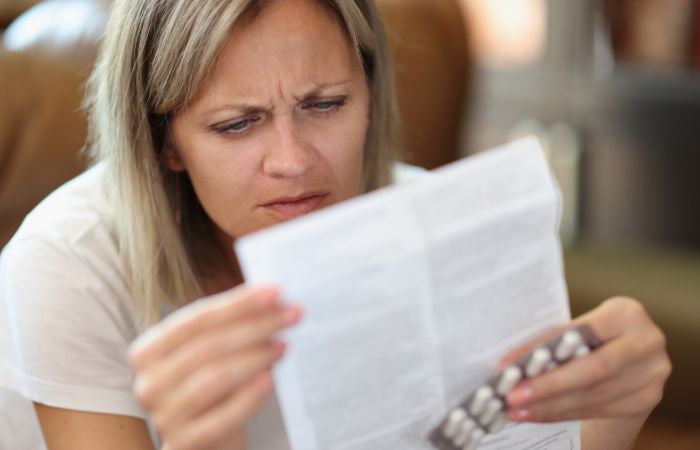Why This Conversation Is So Much Harder the Second Time
The first time you talked about chlamydia, it was probably awkward, but forgivable. The second time? It feels loaded. Suddenly, there’s doubt. Suspicion. Fear. Maybe even anger.
And if you were supposed to be monogamous? Now we’re talking about potential betrayal, broken trust, or at the very least, something went wrong that no one wants to admit.
But before you spiral, remember this: reinfection is medically common, not a moral failure. According to the CDC, nearly 1 in 5 people with chlamydia will test positive again within a few months, often because a partner wasn’t treated or a new exposure happened silently.
The point is this sucks. But it doesn’t mean you did anything wrong, and you still get to decide how you show up in the conversation.

People are also looking for... Is My Test Wrong, or Is Something Still Going On?
Scripts: How to Start the Talk Without Losing Your Mind
Let’s get practical. If your voice is shaking, your heart is pounding, and your stomach’s in knots, here are some real-life conversation openers you can adapt:
If You Want to Be Calm but Direct
“Hey, I need to talk to you about something serious. I just tested positive for chlamydia again. I followed my treatment before, so this could be a reinfection or something else, but we both need to get tested again and talk it through.”
If You’re Nervous, They’ll Get Defensive
“I don’t want to come at you with blame or assumptions, but I tested positive for chlamydia again. I know this is hard to hear. Can we talk about what we both need to do next?”
If They Already Know About the First Infection
“So I retested like I was supposed to… and it came back positive again. This might be leftover bacteria, but I think we should both get checked to be safe.”
These scripts aren’t magic, but they open the door. And that’s the hardest part.
What If They Get Angry, Defensive, or Dismissive?
Not everyone handles STD conversations well. Some get scared and shut down. Others lash out. And sadly, some will try to flip the blame on you.
Here’s how to navigate common reactions:
- If They Say: “You must’ve given it to me.” Try: “I understand why you’re upset, but let’s not play the blame game. We both need to get tested and make sure we’re okay.”
- If They Say: “That’s not possible, I was tested.” Try: “Testing too early or having no symptoms doesn’t always mean someone’s in the clear. Let’s retest to be sure.”
- If They Refuse to Get Tested: You can say: “I respect your choice, but I need to protect my health. I’ll move forward accordingly based on your decision.”
You’re allowed to have boundaries. If they’re refusing care, gaslighting you, or shaming you for something that’s medically common, you don’t have to sit in that space.
Check Your STD Status in Minutes
Test at Home with Remedium7-in-1 STD Test Kit

 For Men & Women
For Men & Women Results in Minutes
Results in Minutes No Lab Needed
No Lab Needed Private & Discreet
Private & DiscreetOrder Now $129.00 $343.00
For all 7 tests
When the Relationship is New (or Just Getting Serious)
If this is a new or casual partner, the stakes might feel even higher. You’re worried they’ll ghost. Or think you’re “risky.” Or worse: tell other people.
Here’s what you need to know:
- STDs don’t make you unworthy of love or sex
- Good partners will respect honesty, even if they’re surprised
- You don’t need to apologize for being responsible
Want to make it less intimidating? Use something like:
“Hey, I just found out I tested positive for chlamydia again. It’s treatable, and I wanted you to know so we can figure out the next step, no pressure, just transparency.”
If they leave you for being honest? They were never safe to begin with.
Protecting Your Peace During the Fallout
After you have “the talk,” expect a wave of emotions, yours and theirs. Here’s how to protect yourself no matter how it goes:
- Have the conversation in a neutral space, not in bed or during a fight
- Know your facts: Reinfection and testing mistakes happen. It’s not always cheating.
- Offer solutions: Suggest mutual testing or at-home chlamydia test kits
- Take space if needed: You don’t owe anyone your body while figuring things out
Want full privacy and proof in your hands? Use an FDA-cleared kit like the Chlamydia & Gonorrhea 2-in-1 At-Home Rapid Test Kit to confirm your results and protect your boundaries.

People are also looking for... Talking to Teens About STDs: The Conversation That Could Save Their Health
Protecting Your Peace During the Fallout
After you have “the talk,” expect a wave of emotions, yours and theirs. Here’s how to protect yourself no matter how it goes:
- Have the conversation in a neutral space, not in bed or during a fight
- Know your facts: Reinfection and testing mistakes happen. It’s not always cheating.
- Offer solutions: Suggest mutual testing or at-home chlamydia test kits
- Take space if needed: You don’t owe anyone your body while figuring things out
Want full privacy and proof in your hands? Use an FDA-cleared kit to confirm your results and protect your boundaries.
FAQs
1. How do I talk about an STD without sounding accusatory?
Lead with facts and care, not assumptions. Use “we” language and focus on mutual solutions, not blame.
2. What if my partner blames me?
Stay calm and don’t internalize the shame. Chlamydia is common, and blame only blocks healing. Suggest testing and clear communication.
3. How do I ask them to get tested again?
Say something like, “I’d feel better if we both retested, just to be sure.” Normalize it as part of mutual care.
4. Can I give them a test without involving a clinic?
Yes. Send them a discreet chlamydia home test kit so they can test privately and safely.
5. What if they think I’m accusing them of cheating?
Reassure them: “This isn’t about accusations. It’s about clarity and protecting both of us.”
6. Should I stay with someone who refuses to test?
That’s up to you, but refusal to test is a red flag. Your health comes first.
7. How do I talk about chlamydia in a queer relationship?
The same way, with respect, facts, and honesty. Just ensure your language reflects both partners’ anatomy and risks.
8. What if they ghost me after I tell them?
That sucks, but it’s on them, not you. You did the brave, adult thing by being honest. Protect your peace.
9. How can I rebuild trust after this?
Mutual testing, open communication, and giving each other time to process helps. But both partners must be willing.
10. What if I’m too ashamed to bring it up?
You’re not alone. Shame is real, but you’re doing the responsible thing. You’re allowed to protect your health and still deserve connection.
Say It Because You Deserve Safety, Not Just Clarity
There’s no “perfect” way to bring up a second STD test, but there are ways to do it that protect your safety, your boundaries, and your self-worth.
You don’t owe anyone a flawless delivery. You owe yourself the truth, and a shot at navigating this with integrity.
Remember:
- Testing positive again isn’t your fault, it’s a medical reality, not a moral failure
- You can bring it up calmly, clearly, and without shame
- If they don’t respect your honesty or refuse to act, that’s on them
Because no matter how hard the conversation is, you’re still worthy of safety, sex, and love.
Sources
1. Planned Parenthood – How Do I Talk With My Partner About STD Results (Chlamydia)?
2. Them – How to Talk to Your Partners About STIs, According to Queer Experts
3. Texas DSHS – “What About Your Partners?” Communication Tips for Disclosing Chlamydia
4. Evvy – How to Tell Your Partner You Have an STD (Including Why Reinfection Isn’t Cheating)










